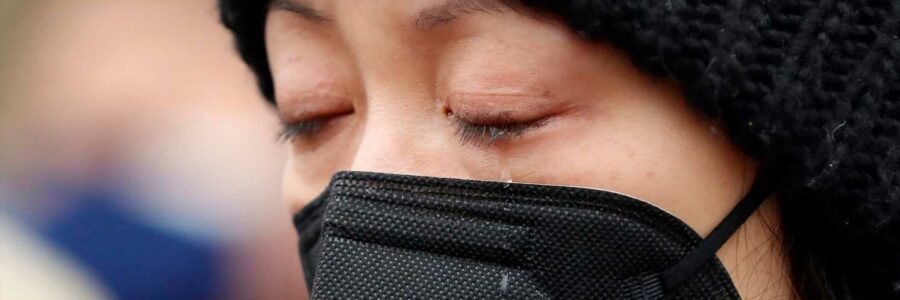
Why bias blocks Asian Americans from top leadership positions
Recent weeks have seen crimes against Asians and Pacific Islanders make headlines across the U.S. From verbal and physical attacks, to murders and mass shootings, these heinous crimes are forcing us to address a persistent, pervasive and largely unspoken national problem. There is an inherent bias toward the API community in America.
In many cases, it’s an unconscious bias, rooted in an ignorance of our cultures and diversity. But it is bias all the same, one compounded by miscast blame of the COVID-19 pandemic on people of API descent.
This is an uncomfortable conversation that people have ignored for decades, including those of us in the API community. Our culture is not one where we speak out. The wise person in our culture is the quiet one.
So instead, we have kept our heads down and worked hard to chase the American dream, choosing politeness and silence that let this bias continue unchecked. Like a cancer it has metastasized, growing stronger and more virulent over time.
The latest rash of crimes and murders have compelled a chorus of voices to speak up. It has been heartening to see so many people — and importantly people outside of the API community — stand in solidarity.
Calling out this inherent bias on its face is critical, but it also highlights a second societal problem: A dearth of APIs in leadership roles in our country.
We have not historically seen API role models portrayed as leaders in our society. Whether it’s movies and TV shows or advertisements, we are often shown as owners of a restaurant or dry-cleaning business. “Crazy Rich Asians” was one of the first blockbuster movies I remember seeing where we were not small business owners. This extends beyond pop culture into real life.
A woman sheds a tear during a vigil and rally against Asian hate crimes, Friday, March 26, 2021, at Chicago's Horner Park. The event is organized by local Chicago organizations led by Asian Americans and Pacific Islanders. (AP Photo/Shafkat Anowar) ORG XMIT: ILSA107 (Photo: Shafkat Anowar, AP)
Growing up in West Virginia, I felt many times that my family was the only Asian one in the entire state. As I proceeded to medical school and residency, I found myself among a greater number of API colleagues.
A huge number of us pursue careers in the sciences; however, when you look at our careers, the vast majority plateau early on. Instead of a professional leadership trajectory, it’s a flat line.
When I worked at the National Institutes of Health in the 1990s, it was largely the API community in the lab doing the frontline work. Few ascended to department chairs or other senior positions. We have not felt empowered to pursue promotions, to seek the next rung on the ladder. The higher you move up in medicine, the fewer of us there are.
Today, not many APIs serve as CEOs and department chairs or lead government agencies. Few health sector operations have API CEOs. I’m one of, if not the only, Asian leading a major national cancer center.
Only 35 API men and women were appointed as new CEOs of Fortune 500 companies between 2000 and 2020. This vast underrepresentation leads to unconscious bias.
APIs overlooked as leaders
It feels impossible to move ahead in your career when people categorically overlook you community as leaders. According to the U.S. Census Bureau, APIs comprise 6.5% of the U.S. population. If we want to correct inherent bias, we need to make sure our leadership looks like our country. It is imperative that we elevate more APIs into positions of leadership across every sector and move away from the status quo of “white men and then everyone else.”
While diversity has always played a role in Moffitt Cancer Center’s 35-year history, we strengthened our efforts in 2003, launching a Diversity & Inclusion department. This team has worked diligently not only to build a diverse team, but in its research of disparities in cancer – spanning awareness, community engagement, equity and access challenges, and the impact of certain cancers on communities of color.
We remain committed to building our staff and our leadership to mirror the diversity of the nation. If every organization takes on this challenge, we will be able to see immediate impact.
Address unconscious bias
Part of that work also starts within our own community. I advise the API men and women I mentor to start with self-empowerment. Do not wait for someone to build your path —you must pursue your own trajectory of growth.
On the national scale, we will not see changes in leadership until we address unconscious bias. Having uncomfortable conversations about how APIs are viewed in this country is so important.
And we must challenge our own understanding of who a leader is — including race, ethnicity, gender, among other demographic consideration. It’s time we put disproportionate emphasis on the inclusion part of diversity and inclusion.
We saw the multinational, multicultural cooperative response to the pandemic in the successful development of COVID-19 vaccines. It was through coordination and the ready embrace of the best and brightest minds worldwide that we were able to effect change that is saving lives globally.
If we take a similar approach in uplifting the best minds in this country, we can effect change in how we see each other and the world.
Dr. Patrick Hwu is president and CEO of the H. Lee Moffitt Cancer Center & Research Institute in Tampa, Fla.
You can read diverse opinions from our Board of Contributors and other writers on the Opinion front page, on Twitter @usatodayopinion and in our daily Opinion newsletter. To respond to a column, submit a comment to [email protected].
Source: Read Full Article
